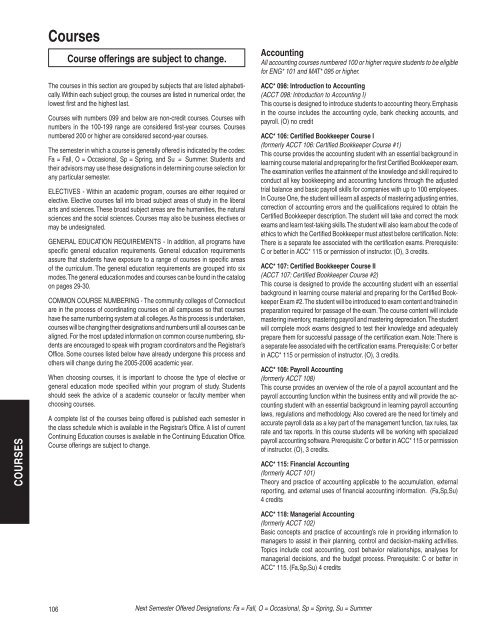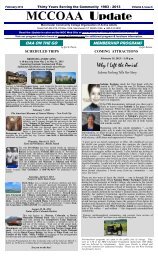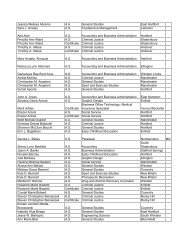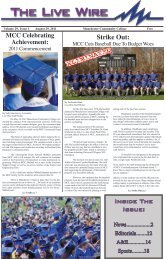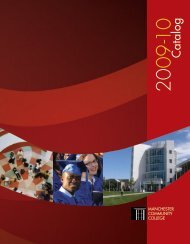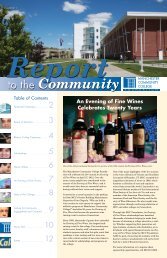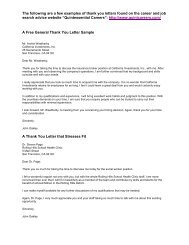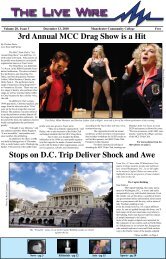Liberal Arts and Science - Manchester Community College ...
Liberal Arts and Science - Manchester Community College ...
Liberal Arts and Science - Manchester Community College ...
Create successful ePaper yourself
Turn your PDF publications into a flip-book with our unique Google optimized e-Paper software.
COURSES<br />
Courses<br />
106<br />
Course offerings are subject to change.<br />
The courses in this section are grouped by subjects that are listed alphabetically.<br />
Within each subject group, the courses are listed in numerical order, the<br />
lowest first <strong>and</strong> the highest last.<br />
Courses with numbers 099 <strong>and</strong> below are non-credit courses. Courses with<br />
numbers in the 100-199 range are considered first-year courses. Courses<br />
numbered 200 or higher are considered second-year courses.<br />
The semester in which a course is generally offered is indicated by the codes:<br />
Fa = Fall, O = Occasional, Sp = Spring, <strong>and</strong> Su = Summer. Students <strong>and</strong><br />
their advisors may use these designations in determining course selection for<br />
any particular semester.<br />
ELECTIVES - Within an academic program, courses are either required or<br />
elective. Elective courses fall into broad subject areas of study in the liberal<br />
arts <strong>and</strong> sciences. These broad subject areas are the humanities, the natural<br />
sciences <strong>and</strong> the social sciences. Courses may also be business electives or<br />
may be undesignated.<br />
GENERAL EDUCATION REQUIREMENTS - In addition, all programs have<br />
specific general education requirements. General education requirements<br />
assure that students have exposure to a range of courses in specific areas<br />
of the curriculum. The general education requirements are grouped into six<br />
modes. The general education modes <strong>and</strong> courses can be found in the catalog<br />
on pages 29-30.<br />
COMMON COURSE NUMBERING - The community colleges of Connecticut<br />
are in the process of coordinating courses on all campuses so that courses<br />
have the same numbering system at all colleges. As this process is undertaken,<br />
courses will be changing their designations <strong>and</strong> numbers until all courses can be<br />
aligned. For the most updated information on common course numbering, students<br />
are encouraged to speak with program coordinators <strong>and</strong> the Registrar’s<br />
Office. Some courses listed below have already undergone this process <strong>and</strong><br />
others will change during the 2005-2006 academic year.<br />
When choosing courses, it is important to choose the type of elective or<br />
general education mode specified within your program of study. Students<br />
should seek the advice of a academic counselor or faculty member when<br />
choosing courses.<br />
A complete list of the courses being offered is published each semester in<br />
the class schedule which is available in the Registrar’s Office. A list of current<br />
Continuing Education courses is available in the Continuing Education Office.<br />
Course offerings are subject to change.<br />
Accounting<br />
All accounting courses numbered 100 or higher require students to be eligible<br />
for ENG* 101 <strong>and</strong> MAT* 095 or higher.<br />
ACC* 098: Introduction to Accounting<br />
(ACCT 098: Introduction to Accounting I)<br />
This course is designed to introduce students to accounting theory. Emphasis<br />
in the course includes the accounting cycle, bank checking accounts, <strong>and</strong><br />
payroll. (O) no credit<br />
ACC* 106: Certified Bookkeeper Course I<br />
(formerly ACCT 106: Certified Bookkeeper Course #1)<br />
This course provides the accounting student with an essential background in<br />
learning course material <strong>and</strong> preparing for the first Certified Bookkeeper exam.<br />
The examination verifies the attainment of the knowledge <strong>and</strong> skill required to<br />
conduct all key bookkeeping <strong>and</strong> accounting functions through the adjusted<br />
trial balance <strong>and</strong> basic payroll skills for companies with up to 100 employees.<br />
In Course One, the student will learn all aspects of mastering adjusting entries,<br />
correction of accounting errors <strong>and</strong> the qualifications required to obtain the<br />
Certified Bookkeeper description. The student will take <strong>and</strong> correct the mock<br />
exams <strong>and</strong> learn test-taking skills. The student will also learn about the code of<br />
ethics to which the Certified Bookkeeper must attest before certification. Note:<br />
There is a separate fee associated with the certification exams. Prerequisite:<br />
C or better in ACC* 115 or permission of instructor. (O), 3 credits.<br />
ACC* 107: Certified Bookkeeper Course II<br />
(ACCT 107: Certified Bookkeeper Course #2)<br />
This course is designed to provide the accounting student with an essential<br />
background in learning course material <strong>and</strong> preparing for the Certified Bookkeeper<br />
Exam #2. The student will be introduced to exam content <strong>and</strong> trained in<br />
preparation required for passage of the exam. The course content will include<br />
mastering inventory, mastering payroll <strong>and</strong> mastering depreciation. The student<br />
will complete mock exams designed to test their knowledge <strong>and</strong> adequately<br />
prepare them for successful passage of the certification exam. Note: There is<br />
a separate fee associated with the certification exams. Prerequisite: C or better<br />
in ACC* 115 or permission of instructor. (O), 3 credits.<br />
ACC* 108: Payroll Accounting<br />
(formerly ACCT 108)<br />
This course provides an overview of the role of a payroll accountant <strong>and</strong> the<br />
payroll accounting function within the business entity <strong>and</strong> will provide the accounting<br />
student with an essential background in learning payroll accounting<br />
laws, regulations <strong>and</strong> methodology. Also covered are the need for timely <strong>and</strong><br />
accurate payroll data as a key part of the management function, tax rules, tax<br />
rate <strong>and</strong> tax reports. In this course students will be working with specialized<br />
payroll accounting software. Prerequisite: C or better in ACC* 115 or permission<br />
of instructor. (O), 3 credits.<br />
ACC* 115: Financial Accounting<br />
(formerly ACCT 101)<br />
Theory <strong>and</strong> practice of accounting applicable to the accumulation, external<br />
reporting, <strong>and</strong> external uses of financial accounting information. (Fa,Sp,Su)<br />
4 credits<br />
ACC* 118: Managerial Accounting<br />
(formerly ACCT 102)<br />
Basic concepts <strong>and</strong> practice of accounting’s role in providing information to<br />
managers to assist in their planning, control <strong>and</strong> decision-making activities.<br />
Topics include cost accounting, cost behavior relationships, analyses for<br />
managerial decisions, <strong>and</strong> the budget process. Prerequisite: C or better in<br />
ACC* 115. (Fa,Sp,Su) 4 credits<br />
Next Semester Offered Designations: Fa = Fall, O = Occasional, Sp = Spring, Su = Summer


